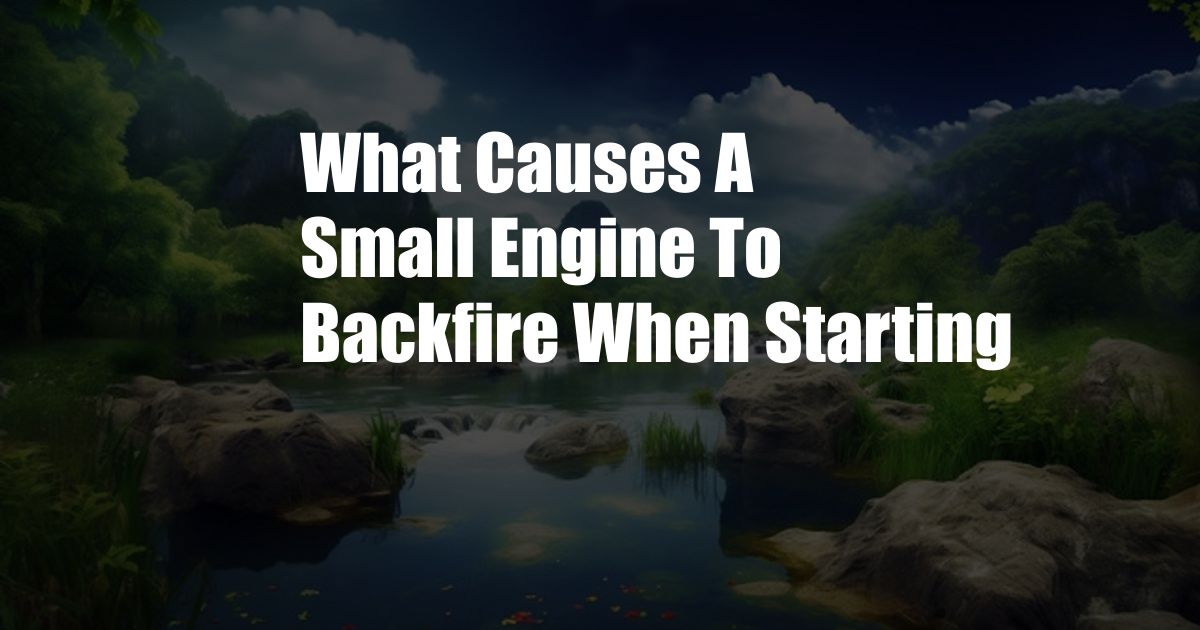
What Makes a Small Engine Backfire When Starting?
Everyone who has ever operated a small engine, from a lawnmower to a snowblower, has likely experienced the occasional backfire. A backfire occurs when the air-fuel mixture in the engine ignites outside of the combustion chamber, usually in the exhaust system. This can create a loud bang and can sometimes send flames shooting out of the exhaust pipe.
There are a number of reasons why a small engine might backfire when starting. The most common causes include:
Incorrect Fuel Mixture
The air-fuel mixture is critical to the proper operation of a small engine. If the mixture is too rich (too much fuel, not enough air), the engine will run poorly and may backfire. If the mixture is too lean (too much air, not enough fuel), the engine will run hot and may also backfire.
The ideal air-fuel ratio for a small engine is between 12:1 and 15:1. This means that for every 12-15 parts of air, there should be 1 part of fuel. The air-fuel mixture can be adjusted by turning the carburetor’s idle speed screw. Turning the screw clockwise will lean out the mixture, while turning it counterclockwise will richen the mixture.
Ignition Timing
The ignition timing is also critical to the proper operation of a small engine. The ignition timing refers to the point in the engine’s cycle when the spark plug fires. If the ignition timing is too advanced (the spark plug fires too early), the engine will run hot and may backfire. If the ignition timing is too retarded (the spark plug fires too late), the engine will run poorly and may not start at all.
The ignition timing can be adjusted by turning the distributor. Turning the distributor clockwise will advance the timing, while turning it counterclockwise will retard the timing. The ideal ignition timing for a small engine is typically between 5 and 10 degrees before top dead center (BTDC).
Valve Clearance
The valve clearance is the amount of space between the valve stem and the rocker arm. If the valve clearance is too small, the valves will not open properly and the engine will run poorly. If the valve clearance is too large, the valves will not close properly and the engine may backfire.
The valve clearance can be adjusted by turning the adjusting screw on the rocker arm. The ideal valve clearance for a small engine is typically between 0.002 and 0.004 inches.
Other Causes
In addition to the most common causes listed above, there are a number of other factors that can also contribute to backfiring in a small engine. These include:
- A dirty or clogged carburetor
- A weak or faulty spark plug
- A cracked or damaged exhaust manifold
- A leaking intake manifold
- A worn or damaged piston
If you are experiencing backfiring with your small engine, it is important to troubleshoot the problem and identify the cause. Once you have identified the cause, you can take steps to correct it and prevent the problem from recurring.
Tips for Preventing Backfiring
There are a number of things you can do to prevent backfiring in your small engine. These include:
- Use the correct fuel mixture.
- Set the ignition timing correctly.
- Adjust the valve clearance correctly.
- Keep the carburetor clean and free of debris.
- Replace the spark plug if it is worn or damaged.
- Inspect the exhaust manifold for cracks or damage.
- Inspect the intake manifold for leaks.
- Have the engine inspected by a qualified mechanic if you suspect there is a more serious problem.
By following these tips, you can help to prevent backfiring and keep your small engine running smoothly.
FAQ
Why does my small engine backfire when I start it?
There are a number of reasons why a small engine might backfire when starting. The most common causes include an incorrect fuel mixture, ignition timing, or valve clearance.
How can I prevent my small engine from backfiring?
There are a number of things you can do to prevent backfiring in your small engine. These include using the correct fuel mixture, setting the ignition timing correctly, adjusting the valve clearance correctly, keeping the carburetor clean and free of debris, replacing the spark plug if it is worn or damaged, inspecting the exhaust manifold for cracks or damage, and inspecting the intake manifold for leaks.
Is it dangerous if my small engine backfires?
Backfiring can be dangerous if it is not corrected. A backfire can cause flames to shoot out of the exhaust pipe, which can start a fire. It can also damage the engine.
Do you need professional help if your small engine is backfiring?
If you cannot identify and correct the cause of the backfiring, you may need to take your engine to a qualified mechanic. The mechanic can diagnose the problem and make the necessary repairs.
Conclusion
If you are experiencing backfiring with your small engine, it is important to troubleshoot the problem and identify the cause. Once you have identified the cause, you can take steps to correct it and prevent the problem from recurring.
Are you interested in learning more about small engines? If so, please leave a comment below and I will be happy to answer your questions.